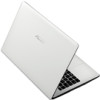Asus X501U User's Manual for English Edition - Page 45
Thermal Power Control, temperature not CPU.
 |
View all Asus X501U manuals
Add to My Manuals
Save this manual to your list of manuals |
Page 45 highlights
Thermal Power Control There are three power control methods for controlling the Notebook PC's thermal state. These power control cannot be configured by the user and should be known in case the Notebook PC should enter these states. The following temperatures represent the chassis temperature (not CPU). • The fan turns ON for active cooling when the temperature reaches the safe upper limit. • The CPU decreases speed for passive cooling when the temperature exceeds the safe upper limit. • The system shut down for critical cooling when temperature exceeds the maximum safe upper limit. Notebook PC User Manual 45

Notebook PC User Manual
45
Thermal Power Control
There are three power control methods for controlling the Notebook
PC’s thermal state. These power control cannot be configured by
the user and should be known in case the Notebook PC should
enter these states. The following temperatures represent the chassis
temperature (not CPU).
•
The fan turns ON for active cooling when the temperature reaches
the safe upper limit.
•
The CPU decreases speed for passive cooling when the temperature
exceeds the safe upper limit.
•
The system shut down for critical cooling when temperature ex
-
ceeds the maximum safe upper limit.














